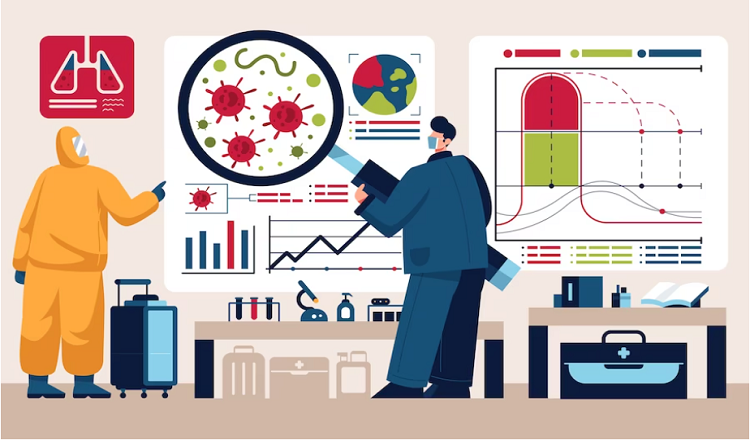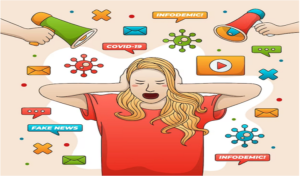Examining the Causes of Infectious Disease Outbreaks

Outbreaks of infectious diseases could have terrible effects on communities and countries all over the world. These events can spread quickly and cause deaths, damage to the economy, and trouble with daily life. It is important to know what causes these attacks so that they can be stopped and kept under control. In this piece, we will look at what causes infectious disease outbreaks and what can be done to stop them.
What causes outbreaks of infectious diseases?
Changes in climate
Climate change has a big impact on how deadly diseases come about and spread. As temperatures rise, new places for insects and animals that carry diseases to live are made. This means that diseases like dengue, Zika, and malaria, which are spread by mosquitoes, are more likely to happen. Extreme weather events like storms and droughts can also make it easier for diseases that are spread by water, like cholera and typhoid fever, to spread.
Global Travel
With more people travelling around the world, dangerous diseases are more likely to spread to different parts of the world. People can go anywhere in the world in just a few hours, which means diseases can spread very quickly across countries. Also, travellers may bring sicknesses with them when they go to new places. In the past, diseases like SARS, Ebola, and Zika showed this.
Urbanization
The spread of infectious diseases has also been helped by the growth of cities and towns. Cities have a lot of people living close to each other, which can make it easier for illnesses to spread. Water-borne diseases like cholera and typhoid fever can also spread in cities where cleanliness and hygiene aren’t very good.
Agricultural Practises
How we grow and eat our food can also make it easier for deadly diseases to spread. Deforestation and intensive farming can upset natural environments and allow pathogens that were once contained to come out and spread. Also, using antibiotics to raise animals can lead to the growth of bacteria that can’t be killed by antibiotics. These bacteria can then spread to people.
Public health measures to deal with the causes of infectious disease outbreaks
Public health steps are one of the best ways to stop and control the spread of infectious diseases. This includes things like vaccine programmes, keeping an eye out for diseases, and handling outbreaks. Diseases like measles, polio, and flu can be stopped from spreading with the help of vaccines. Disease monitoring can help find outbreaks quickly so that they can be stopped quickly. To stop the spread of disease, methods like isolation and quarantine are used in outbreak management.
Environmental Solutions
It is also important to deal with the environmental factors that lead to cases of infectious diseases. This could include things like programmes to get rid of mosquitoes, better sanitation and health, and steps to deal with climate change. Diseases like dengue and Zika can spread more quickly when mosquitoes are around. Cholera and typhoid fever are two diseases that are spread by water that can be stopped by better cleaning and hygiene. Taking steps to stop climate change can help lower the risk of diseases like malaria and dengue, which are linked to changes in temperature and rainfall trends.
Working together across borders
When dealing with cases of infectious diseases, it is often necessary for countries to work together. This means that countries and organisations need to work together to share knowledge, resources, and expertise. This can be done through things like sharing data on disease surveillance, working together to get people vaccinated, and giving help and technology support during outbreaks. International coordination can help make sure that outbreaks are dealt with in a coordinated and effective way.
Changes in policy
Lastly, policy changes may be needed to deal with the root causes that lead to outbreaks of infectious diseases. This could include things like putting rules on how farms work, making it harder to move internationally during an outbreak, and investing in public health infrastructure. Changes to policies can help get at the root reasons of infectious disease outbreaks, making them less likely to happen again.
Conclusion
Outbreaks of infectious diseases can be very bad for people, groups, and even whole countries. It is important to know what causes these attacks if you want to stop them or get them under control. Climate change, global travel, the growth of cities, and farming practises are all things that can lead to cases of infectious diseases. To deal with these issues, public health measures, solutions for the environment, foreign cooperation, and policy changes are needed. By working together to fix these problems, we can lower the chance that dangerous diseases will spread and protect public health.
Read More You May Like:
- Effective Ways to Prevent and Contain Disease Outbreaks
- Education and Awareness Campaigns for Disease Prevention
- Delving Into The Science Behind Outbreak Mitigation and Response
- Conflict and Disease Outbreaks: The Interplay Between Social Factors
- Analyzing the Economic Cost of Public Health Emergencies








